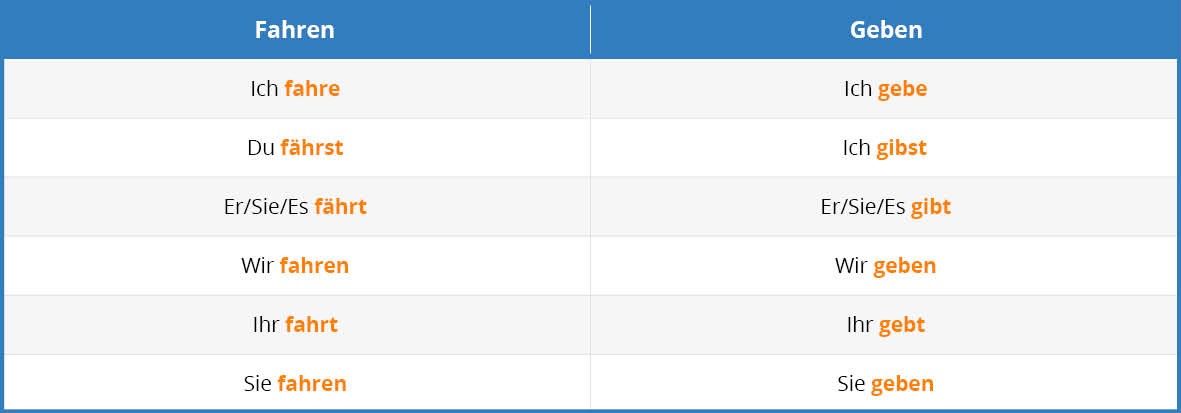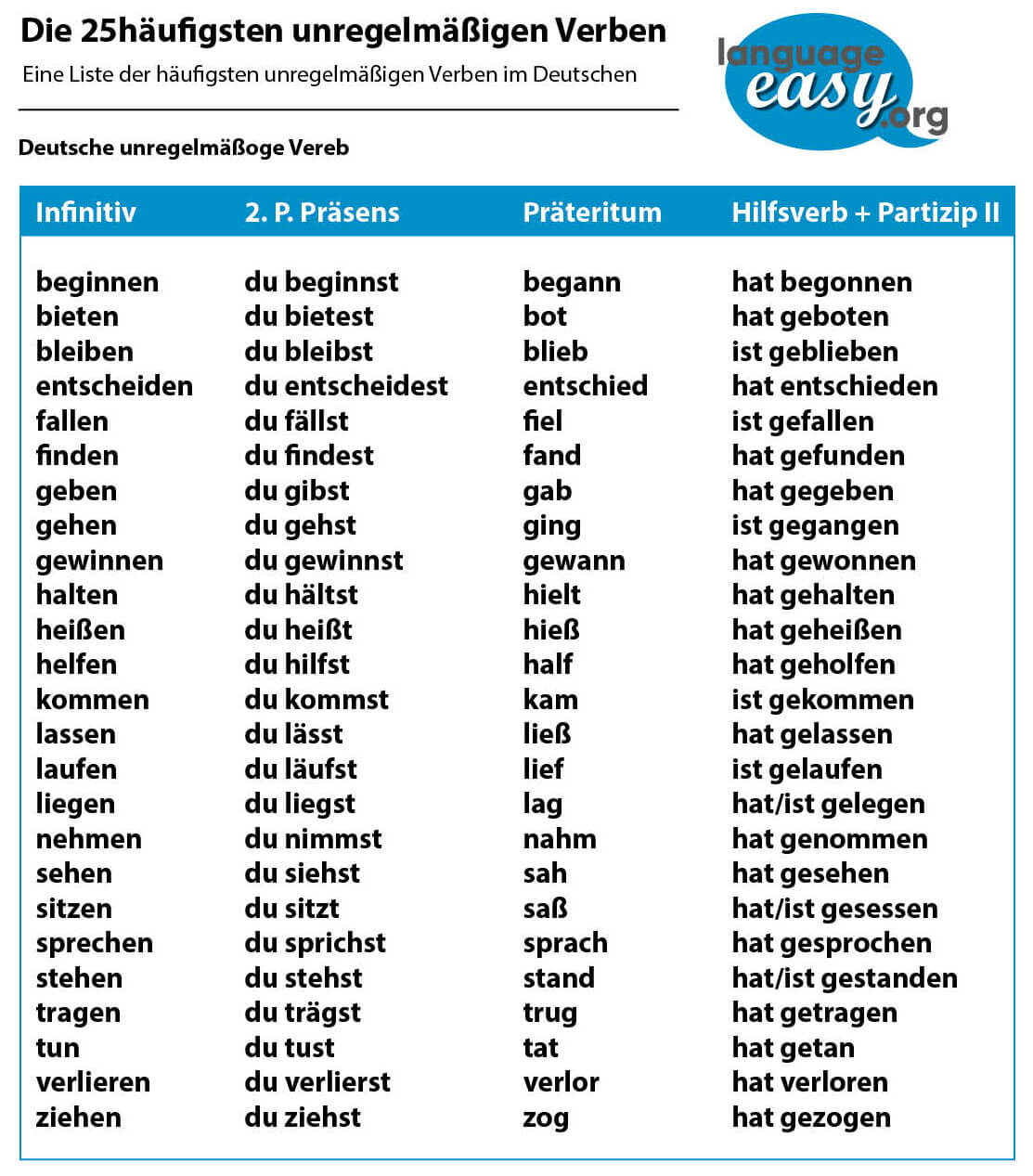German Irregular Verbs
Unregelmäßige Verben im Deutschen
German Irregular Verbs – Summary
Zusammenfassung
Irregular verbs, also called strong verbs in German, can be distinguished from the other types of verbs by the following factors:
- Infinitive (“leben, tragen”)
- Paste tense (“er lebte, er trug”)
- Participle 2 (“gelebt, getragen”)
In German, there are about 150 strong verbs. The vowel, which normally changes in the verb, is called “Ablaut”. There are three typical patterns of “Ablaut” changes:
- e – i – a: “gehen – ging – gegangen”
- a – u – a: “fahren – fuhr – gefahren”
- i – a – u: “finden – fand – gefunden”
There are other types of verbs, the so-called mixed verbs. Examples would be “denken – dachte – gedacht” oder “brennen – brannte – gebrannt”.
“Ich esse.” – “Ich aß.”
Well, most of you might have seen this verb: “essen”. So, up here, you can see its 1st person singular form in the present tense. After that, you can see its form in the past tense.
Can you tell me, why this verb changes completely from one tense to another? Well, I can tell you why: It’s a German irregular verb!
Actually you have already entered one of the ugliest parts of German Grammar. So, you better be positive – once you have understood this topic, there is nothing that can frighten you anymore.
In the following, I’d like to give you some examples for irregular verbs. Furthermore, I’ll present to you five useful tricks that will help you to master this topic. It is important that you also understand German verbs in general.
The Importance of German Irregular Verbs
Die Wichtigkeit von unregelmäßigen Verben im Deutschen
Of course, knowing that by passing this topic you master one of the most difficult ones in German should not be your only encouraging factor. So, here is why German irregular verbs are actually that important.
1. All Modal Verbs are German Irregular Verbs
Well, I am sure that most of you have heard about modal verbs. So, there are:
- “können” – can
- “müssen” – must
- “wollen” – want to
- “sollen” – should
- “dürfen” – to be allowed to
- …
Probably it’s unnecessary to talk about the crucial importance of these verbs in German, as well as in the English language. So, in order to conjugate them in the correct way, you should master irregular verbs.
2. The three Auxiliary Verbs are German Irregular Verbs
Whether you’d like to form a special tense of say something in the passive mood – you always need an auxiliary verb (haben and sein). Unfortunately, all three of them are German irregular verbs:
- “haben” – to have
- “sein” – to be
- “werden” – to become
3. A lot of other important Verbs are irregular
Well, to think, to help, to eat, to run — all of these common verbs are irregular. Unfortunately, messing up verb conjugation can mark you pretty quickly as a non-native speaker. So, just imagine if you heard someone say “I runned” instead of “I ran.” It would be a tip-off that this person was learning English. That’s why it’s important to learn how to conjugate these verbs.
Four Tricks to master German Irregular Verbs
Fünf Tricks um unregelmäßige Verben im Deutschen zu beherrschen
In the following, I’d like to present to you four tricks that could help you to master German irregular verbs.
1. The Difference between Weak and Strong Verbs
Of course, most of you know that there are actually three kinds of verbs: Weak, strong and mixed verbs. Well, that is also the main reason why you say “du läufst” instead of “du laufst”.
What is a Strong Verb?
Well, strong verb change their stems, based on the conjugation, as well as in the two past tenses. So, some of these stem changes in the present tense simply involve adding an “ä” or an “ö” in place of an “a” or an “o”. Other stems in the present tense undergo a complete change. Unfortunately, you simply have to recognize strong verbs by learning them by heart. Nevertheless, there is an example:

2. Learn the Past Tense of Strong Verbs
Although you might think that you have mastered German irregular verbs by knowing how to conjugate them in the present tense, I have to disappoint you. Unfortunately, their forms in the past tense are as irregular as the ones in the present tense. Well, at least there is one rule: All strong verbs in German use –en at the end of their stem to form the Participle II.
- “Ich habe gewonnen.” (I have won.)
- “Ich habe begonnen.” (I was beginning.)
3. Understand the Principles of Mixed Verbs
So, a mixed verb is a verb that combines some characteristics of weak verbs and strong verbs. Well, almost all mixed verbs are regular in the present tense, but in the past tense, they combine the ending of a weak verb (“-t” for Participle II, and “–te” for Präteritum) with the vowel change of a strong verb. In the following, I’d like to present to you the most common mixed verbs.
- “haben, hatte, gehabt” (to have, had, have had)
- “kennen, kannte, gekannt” (to know, knew, have known someone)
- “wissen, wusste, gewusst” (to know, knew, have known something)
- “denken, dachte, gedacht” (to think, thought, have thought)
- “bringen, brachte, gebracht” (to bring, brought, have brought)
- “rennen, rannte, (bin) gerannt” (to run, ran, have run)
- “nennen, nannte, genannt” (to call, called, have called)
- “brennen, brannte, gebrannt” (to burn, burned, have burned)
4. Mind the “-ieren” Verbs
Basically, an “-ieren” verb is one of a handful of verbs, many of which came to German through French, ending in “-ieren”. These verbs follow the pattern of weak verbs, except for one fact. In the Participle II form, instead of putting “ge-” at the beginning, you simply put a “-t” on the end.
- “Diskutieren” (to discuss) is formed in the past as “Ich habe diskutiert” (I have discussed).
- “Existieren” (to exist) is formed in the past as “Ich habe existiert” (I have existed).
- “Fotografieren” (to photograph) is formed as “Ich habe fotografiert” (I have photographed).
Exercises
Übungen
Finally, we have reached the last part of this article where you can prove the German skills you have just learned. In the following you will see some phrases that you should complete with the correct terms. Once you have filled all the gaps, just click on the “correct” button and you can see your errors and the correct results. Good luck and… auf Wiedersehen!



